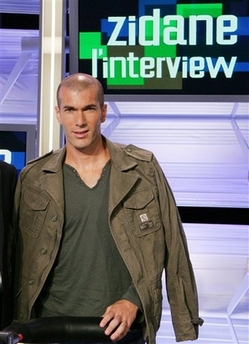PARIS - An apology, but no regrets and no detailed explanation on what set
him off. That's where French soccer star Zinedine Zidane left things Wednesday
during widely broadcast television interviews that attempted to decipher his
ugly head-butting of an Italian opponent during the World Cup final.

In this photo made
available by Canal Plus, French soccer star Zinedine Zidane, poses prior
to a television interview, in Paris, Wednesday, July 12, 2006. Zinedine
Zidane apologized for his violent conduct during the World Cup final in
Berlin, Germany.[AP] |
He did say he was spurred by cruel insults to his mother and sister. But the
exact exchange between France's captain and Marco Materazzi remains a mystery.
Zidane never was specific about what enraged him. So, for the moment, the words
stay between them.
"I would rather have taken a punch in the jaw than have heard that," he told
the Canal-Plus television network, stressing that Materazzi's language was "very
harsh," and that he uttered the insults several times.
In his first public comments since Sunday's match, Zidane repeatedly
apologized to fans ¡ª especially to children. But he said he didn't regret the
abrupt, violent outburst that marked the end of his illustrious 18-year
professional career.
"I tell myself that if things happened this way, it's because somewhere up
there it was decided that way," the 34-year-old midfielder said in an interview
on TF1 television. "And I don't regret anything that happened, I accept it."
Zidane and Materazzi exchanged words after Italy broke up a French attack in
extra-time. Seconds later, Zidane lowered his head and rammed Materazzi in the
chest, knocking him to the ground.
Zidane was sent off, reducing France to 10 men. Italy went on to win in a
penalty shootout with Zidane in the locker room.
The act of aggression marred the end of the World Cup, with many warning it
would tarnish the legacy of Zidane, who retired after the tournament.
Wednesday, he stressed he felt no regret "because that would mean (Materazzi)
was right to say all that."
"There was a serious provocation," Zidane said. "My act is not forgivable.
But they must also punish the true guilty party, and the guilty party is the one
who provokes."
For days, sports fans around the world have been riveted by the question:
What could Materazzi have said to set Zidane off in the last few moments of his
illustrious, 18-year career? Media from Brazil to Britain hired lip readers to
try to figure it out, then came up with different answers.
Materazzi has acknowledged he insulted Zidane, without giving specifics. At
nearly the same moment Zidane was on TV, excerpts from a Materazzi interview
were posted on an Italian paper's Web site. He denied insulting Zidane's mother.
"I didn't say anything to him about racism, religion or politics," Materazzi
told the Gazzetta dello Sport. "I didn't talk about his mother, either. I lost
my mother when I was 15, and even now I still get emotional talking about her."
Zidane "has always been my hero," Materazzi said. "I admire him a lot."
Materazzi spoke to Zidane in Italian. Zidane, who played several years for
Juventus in Turin, speaks Italian.